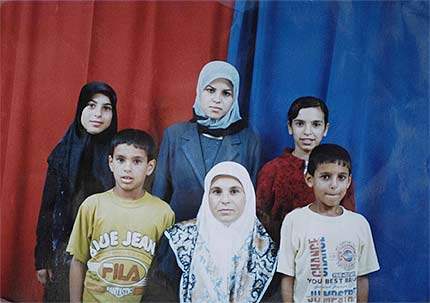
430_palestinianfamily_0.jpg, image/jpeg, 430x303
About 11.30am last Tuesday, within moments of each other, Asma al-Mughair, 16, and her brother Ahmed, 13, died on the roof of their home in the Tel Sultan district of Rafah. The Israeli Defence Force, whose soldiers and tanks had just occupied Tel Sultan, said the next day that it had investigated the incident and concluded that the siblings were killed by "a work accident" - a euphemism for a militant's bomb that explodes while it is being assembled - or by a roadside bomb set by Palestinian militants.

430_palestinianfamily_0.jpg, image/jpeg, 430x303
Cut down . . . Asma and Ahmed al-Mughair, both on the left, pictured in a family photo.
Palestinian family blames Israeli sniper for deaths of two children
By Ed O'Loughlin, Herald Correspondent in Rafah
May 24, 2004
About 11.30am last Tuesday, within moments of each other, Asma al-Mughair, 16, and her brother Ahmed, 13, died on the roof of their home in the Tel Sultan district of Rafah.
The Israeli Defence Force, whose soldiers and tanks had just occupied Tel Sultan, said the next day that it had investigated the incident and concluded that the siblings were killed by "a work accident" - a euphemism for a militant's bomb that explodes while it is being assembled - or by a roadside bomb set by Palestinian militants.
It rejected the family's claim that the two children were shot dead by an Israeli sniper - Asma as she took in laundry, Ahmed as he fed the family pigeons.
Dr Ahmed Abu Nkaria, deputy head of Rafah's tiny hospital, concluded that both children had been killed by single gunshots to the head. There was no other sign of trauma, he told the Herald the following day.
On Saturday two small groups of journalists picked their way past the Israeli tanks and armoured vehicles surrounding Tel Sultan to become the first to enter since the curfew was eased the day before.
At the Mughairs' three-storey house the children's older brother, Ali, 26, showed us the spot in the corner of the rooftop where, he said, Asma had been taking in laundry when a bullet blew the side of her head off. There was still a thick stain of blood and brain matter there.
Smear marks showed where, he said, he had dragged her body towards the stairwell. In the stairwell another pool of blood and brains marked the spot where Ahmed was killed. According to his father, Mohammed, Ahmed was feeding pigeons on the roof when he heard the shot that killed his sister. Seeing her lying in the corner of the roof, he ran into the stairwell to call for help. He then returned to the top of the stairs, where a single bullet struck him in the head.
The rooftop area showed no signs of an explosion. Two large metal satellite dishes were completely unmarked by shrapnel or scorching, although there were three bullet holes in one of the dishes. The wall around the rooftop was unscarred.
Ali al-Mughair said the sniper who shot his brother and sister continued to fire at him as he tried to recover her body from the corner, forcing him to crawl flat on his stomach. The plaster wall inside the stairwell was scarred by at least one bullet, which Mr Mughair says was fired at this time.
Mr Mughair pointed to the spot from which, he says, the sniper or snipers shot his siblings. A crude hole was visible in the wall of a high residential building, a little over 100 metres away.
The owners of this building, the Abu Jalalla family, said that at 10am on Tuesday it was taken over by Israeli troops who kept them all under armed guard in one room of the house until 2am the next day.
A visit to the upper floors revealed that several holes had been knocked through the walls to provide firing points, with mattresses and chairs arranged to allow shooters to watch comfortably for targets.
Half-eaten Israeli Army rations were discarded in the rooms and on the roof, as were spent 7.62mm and 5.56mm bullet cases.
On the roof, the hole that Mr Mughair indicated as the firing point gave an excellent view over his rooftop.
Beside the hole lay a discarded cardboard box. The Hebrew writing on the box read: "20 rounds 7.62 mm ammunition for snipers".
To the naked eye the bullet-torn washing that Asma Mughair never took off the line was clearly visible through the hole, flapping in the breeze. So was the bullet mark in the stairwell.
Officially the Israeli Defence Force says that the incident is still under investigation.
Israeli military sources continue to say that a Palestinian bomb may have killed the children.
The Israeli Defence Force insists that it operates at the highest standards of ethical behaviour consistent with a country at war, and that - unlike Palestinian terrorists - its soldiers never deliberately target civilians.
A Palestinian girl was shot dead on Saturday, a day before her fifth birthday. Israeli military sources reportedly said they did not know of any shooting in the neighbourhood where she was killed.
In the West Bank on Saturday, the Israeli Army said a suicide bomber detonated his explosive belt at a checkpoint near a Jewish settlement, wounding a soldier and three Palestinians.
Agence France-Presse reports: The Israeli Defence Minister, Shaul Mofaz, in an interview published yesterday in Newsweek, apologised for his troops opening fire on Palestinian demonstrators in Rafah, killing at least 10, most of them children, but said Israel was determined to continue operations to halt arms smuggling.
http://www.smh.com.au/articles/2004/05/23/1085250870992.html
Original: Palestinian family blames Israeli sniper for deaths of two children